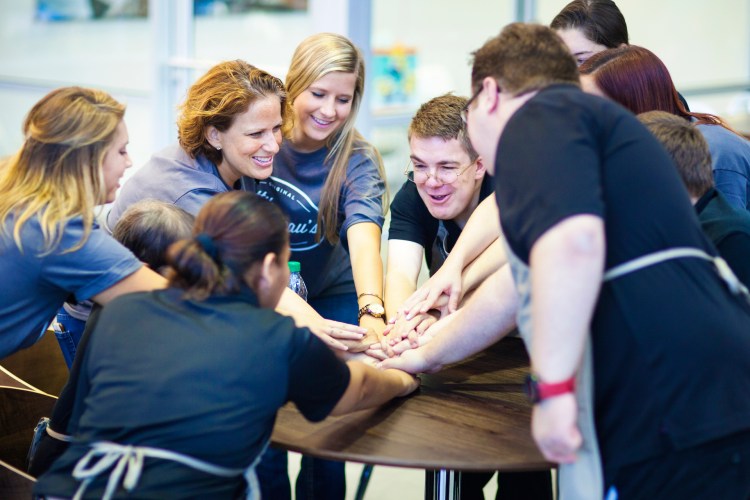As companies seek to place customers at the center of their business, they’re also learning what it means to become a more inclusive business. Our world is diverse, but too often we limit ourselves and others with unintended bias.
In 2014’s “The Inclusion Imperative,” author Stephen Frost wrote, “Diversity is a reality, inclusion is a choice.”© His book focused on the organizational change journey and benefits to businesses who embrace inclusivity.
So what makes a business inclusive, how can a business practice inclusion, and why is inclusivity important? Let’s explore these topics as well as the story of a couple who sought to change the future for people with intellectual and developmental disabilities (IDD).
What does an “inclusive business” mean?
While often described as including people from diverse socio-economic situations, an “inclusive business” really means including everyone, regardless of their differences. An inclusive business emphasizes and fosters equality, whether you’re a customer, an employee, partner, or vendor.
After two of their children were diagnosed with Down Syndrome, Bitty & Beau’s Coffee Co-Founders and Owners Amy and Ben Wright explored what awaited their son and daughter, especially in terms of employment.
“What we discovered,” says Ben, “is that while the education systems have come a long way, they’re designed to prepare kids for jobs that don’t exist for them.” Their kids were still young but the Wrights discovered a staggering statistic …
Eighty-one percent of adults with intellectual or developmental disabilities do not have paid employment” Special Olympics | National Snapshot Research
“Can you imagine if this were any other slice of our population?” asks Ben. “People would be rioting in the streets.”
And, according to the National Council on Disabilities, people with disabilities live in poverty at more than double the rate of people without disabilities.
Reject unintended bias with “The Three Cs”
As the Wrights learned more about the obstacles their children face, they became aware of the challenges others faced interacting with and hiring people with intellectual and developmental disabilities.
Simply, it boils down to, as Ben says, an issue within our cultural and social fabric. He believes, based on their experiences within the community, that people with disabilities are not treated with the same sense of value as someone else. He recognizes that many people are unfamiliar with Down Syndrome, as they were before their son and youngest daughter were born. This lack of familiarity results in discomfort, confusion, and sadly, often a lack of empathy.
To overcome this, the Wrights’ advise all to practice “The Three Cs”:
- Compassion
- Creativity
- Commitment
Further your compassion by spending time with a person who has an intellectual or developmental disability. Have a conversation and expand your perspective on what living with a disability means.
Take your experience back to your place of business and get creative. Focus on the person’s strengths and make accommodations when necessary. Ben and Amy Wright changed how their coffee shops are arranged, placing the coffee machines behind the counter and not in front of their staff. This helped to create a more inviting, conversational environment for all.
Make a commitment to explore and put effort into creating a more inclusive business environment. Could you bring someone in to perform a task, even for a few hours once a week?
At Bitty & Beau’s Coffee, inclusivity means hiring employees with intellectual and developmental disabilities, meeting each individual where he or she is, and playing to his or her strengths.
Why inclusive businesses work
Determined to pave the way for their son Beau and daughter Bitty, the Wrights opened their first location of Bitty & Beau’s Coffee in their home state of North Carolina in 2016. Two more locations followed in South Carolina and Georgia, while a fourth is planned for Maryland in coming months. Soon, Bitty & Beau’s Coffee will employ more than 100 people.
Building an inclusive business didn’t happen overnight, nor was it easy. It took a lot of creativity and support to realize, but the return has been so much more than the cost.
“People come for the experience, more than anything,” says Amy. “Our coffee is great, but it’s the interaction with the staff that brings customers back and inspires them to tell their friends.”
Bitty & Beau’s Coffee creates a culture where diversity is not just appreciated, it’s celebrated.” Bitty & Beau’s Coffee
How to make your business more inclusive
Diverse and inclusive workplaces routinely show greater innovation and in many cases, profitability. They subscribe to a human-centric mission because they recognize the whole person.
When you’re ready to move your business forward, the Wrights encourage these three steps:
1. Make time
Once you spend time with someone, you feel their worth. Once you experience the value of another person, it becomes organically easier to prioritize time to spend with them.
Explore opportunities in your community to connect with people with intellectual and developmental disabilities. You may also find that many people in your company or social circles care for someone with a disability.
Many communities have adaptive sports or activities and frequently need volunteers to assist participants. Invite co-workers and other business owners to join you.
 
2. Make a place
Once you get to know people with disabilities, it’s easier to imagine what they could bring to your business. As you get to know more members of the IDD community, think hard about each individual’s strengths.
Different employees benefit from different accommodations, of course, and it isn’t nearly as prohibitive as you might think. It might be as simple as providing a touchscreen, a stool when fatigue sets in, or rearranging furniture to provide better access. Imagine for a moment, what you would do to accommodate a current employee who’s recovering from surgery or an injury?
The Wrights employ people who live with diagnoses such as Cerebral Palsy, Down Syndrome, and Autism Spectrum Disorder. At Bitty & Beau’s Coffee, the Wrights found the traditional coffee shop set up wasn’t right for them. Because interacting with the employees is such a differentiator and a joy, they removed the visual and physical barriers of the tall counters and coffee machines. They placed the machines on the back counter instead, which allows more natural communication between the staff and customers.
3. Start a conversation
One way to introduce the idea and generate discussion is to share the Bitty & Beau’s Coffee story in your next staff meeting. Or better yet, serve Bitty & Beau’s Coffee in your place of business or the next time you host clients or peers.
Start conversations about why you’ve brought this coffee into the workplace. You’ll be amazed at the creativity and support you’ll find when you share a mission like this with your team.
After all, not all disabilities are congenital. Many people acquire a disability after an accident or a health event like a stroke or heart attack. Be a Trailblazer for equality and realize the value — the intrinsic human value — in people with disabilities.
As Ben Wright said, “When you value people, accepting and including them comes naturally.”
Congrats to Bitty & Beau’s Coffee
So, inspired by the work the Wrights have done to engage with their communities and blaze a trail for equality and accessibility, Salesforce named Amy and Ben Wright winners of the inaugural Salesforce Service Equality Award.

Bitty & Beau’s Coffee Co-Founders Amy and Ben Wright with
employees holding the inaugural Salesforce Service Equality Award
Want to hear the full story of Bitty & Beau’s Coffee? Watch the Wrights tell it in their own words at Dreamforce ‘19.
We invite you to dive into our Heart of Service series:
- Read our first post about how to Chart Your Professional Course with the New Service Career Path
- Join the Service Trailblazer Community and become a #ServiceStar
- Subscribe to our newsletter so you don’t miss the latest from Service Cloud



















![Scheduling mishaps, administrative burden, and burnout are top mobile worker concerns. [Image: Adobe Stock]](https://www.salesforce.com/blog/wp-content/uploads/sites/2/2025/09/Mobile-Worker-Research-1500x844-1.jpg?w=128&h=96&crop=1&quality=75)

![[Illustration] A customer service rep works with an AI agent in a contact center](https://www.salesforce.com/blog/wp-content/uploads/sites/2/2025/07/Reshaping-customer-service-roles-with-AI_Article-2_1500x844.jpg?w=128&h=96&crop=1&quality=75)
![[Illustration] A manager and an AI agent review unified data in a contact center.](https://www.salesforce.com/blog/wp-content/uploads/sites/2/2025/08/Contact-Center-Trends-1500x844-2.jpg?w=128&h=96&crop=1&quality=75)
![[Illustration] An AI agent high-fives a female customer service rep.](https://www.salesforce.com/blog/wp-content/uploads/sites/2/2025/07/Give-Humans-AI-That-is-Humane_-1500x844-1.jpg?w=128&h=96&crop=1&quality=75)




